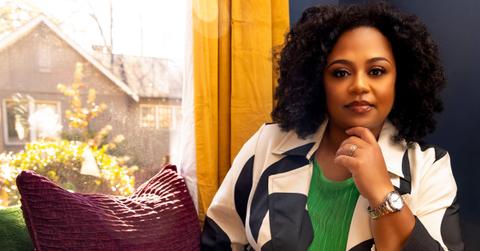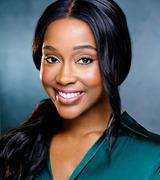Licensed psychologist and host and founder of Therapy For Black Girls, Dr. Joy Harden Bradford, added “author” to her impressive list of titles with the release of her first book, “Sisterhood Heals: The Transformative Power of Healing in Community” last month. The multihyphenate is on a #summerofsisterhoodtour celebrating the power of sisterhood among Black women, and #HerAgendaLive was one of her tour stops.
In her debut book, Dr. Harden Bradford delves deep into the power of Black women’s friendships, offering a psychological perspective that enriches our understanding of nonromantic bonds. In a culture that may sometimes overlook these connections, her book reminds us that our relationships with our girls are not merely secondary. They are essential, deserving of the same care, attention, and intention that we invest in any other significant relationship in our lives.
In this impactful conversation, Dr. Harden Bradford educates #HerAgendaLive viewers on the four sister-friend archetypes, how to make new friends as an adult, navigating work friendships, the importance of bridging the gap between online and in-person communities, and much more.
The expert also provides practical tips on supporting friends through life-changing events and rebuilding trust.
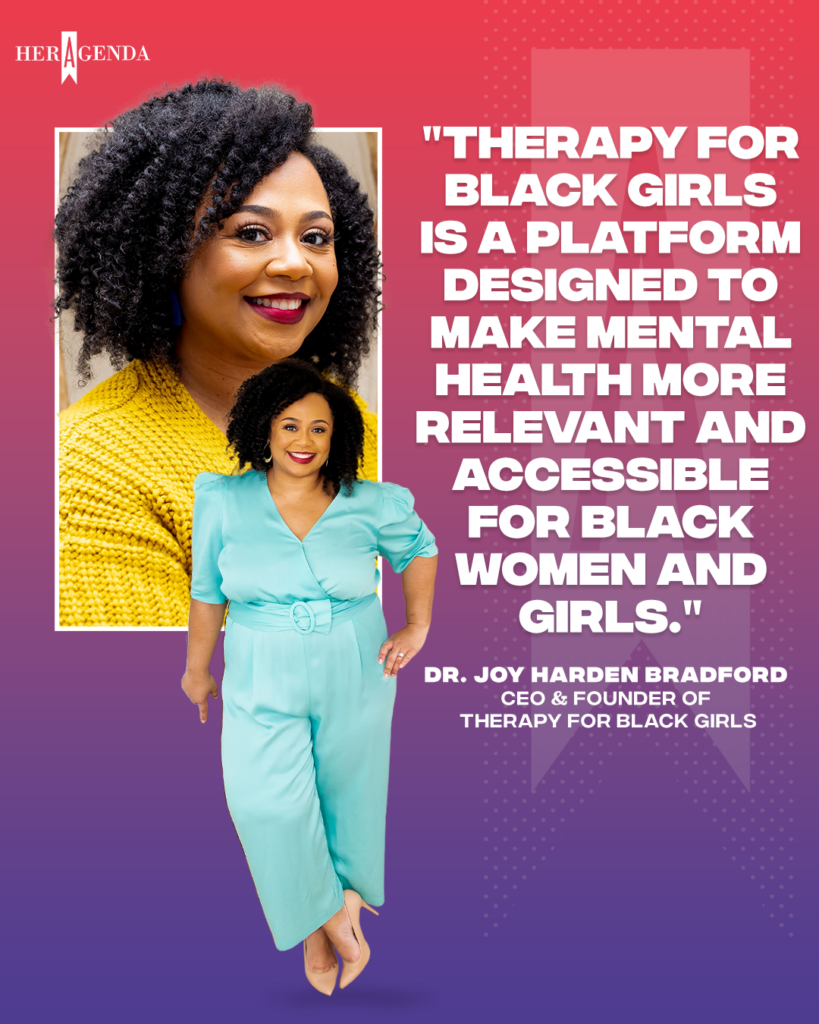
For the full video interview with Dr. Harden Bradford watch via the video player above or click here to watch the playback of our #HerAgendaLive here for our exclusive conversation with Dr. Harden Bradford.
Her Agenda: Congratulations on your new book, “Sisterhood Heals: The Transformative Power of Healing in Community.” Tell us why you chose that title.
Dr. Joy Harden Bradford: Sisterhood Heals, funny enough, actually was supposed to be an in-person event before the pandemic happened. I was planning to gather our community together to have some good conversations about what it means for Black women to show up for one another and to just get to know each other and forge some of those bonds that I think are going to be important throughout our lives. And then the pandemic happened. And so after the pandemic, my book agent and I talked about what kinds of things [I was] planning to talk about [at the Sisterhood Heals event] and how we might turn that into a book. So, Sisterhood Heals was the event name and has now become the book name.
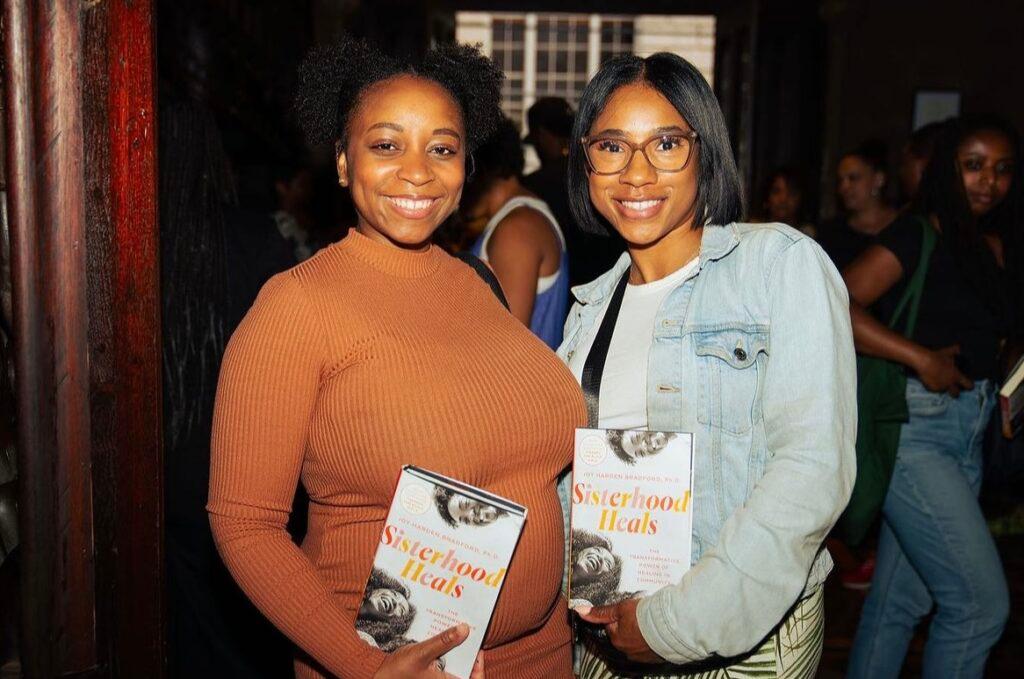
Her Agenda: Awesome. Love it. In your book, you state that there are four friend archetypes. Could you tell us about that?
Dr. Joy Harden Bradford: Yeah, so I love a good archetype, and I think a lot of us love finding out who we are in our circle and what’s our personality type. In my experience, I have found that we are one of four friends in our sister circle. We might be the leader, the wallflower, the firecracker, or the peacemaker. And those terms kind of sound like exactly what you would expect, right? So the leader is the person who is kind of holding the group together. Like if something’s going on, if there’s a group trip, they are likely the ones who have organized it. The wallflower is the sister in our circle who may not say a lot, but when she does speak up, everybody stops and pays attention. The firecracker is the one who will call out the elephant in the room and make sure that we are putting all the cards on the table. And then the peacemaker is the one that, if two people have fallen out in the circle, will call the group together and say, ‘Hey, can we hash this out?’ You can actually find out what your type is by going to sisterhoodheals.com/quiz. We’ve made a quiz for you to find out who you are in your sister circle. Listen, this does not mean that you cannot be friends with people who are a different type because all types are required in the sister circle. It really is about how you show up in the circle, right? So, for instance, the leader, if you are the one who’s organizing all the trips and doing all of the things, that might be really, really great. But what also could happen is that you might be resentful because you don’t feel like other people are showing up in that same way. And so it’s not a quiz to say, ‘Okay, I can’t be friends with a firecracker.’ It really is more about how you can have conversations with your sister circle to learn how you can do a better job of supporting one another.
Her Agenda: What if you’re a certain archetype in your friend group, but you want to shift to another archetype? You’ve outgrown your old one. How do you make that shift within the friendship?
Dr. Joy Harden Bradford: That’s exactly what I want you to do, is to have that conversation with your circle. Because again, I think sometimes we get pegged into these roles and realize, ‘Yeah, I’m good at this, but I don’t actually like doing this.’ Right? Like, I don’t actually like being the one doing all the things or always calling out the elephant in the room. And so I think having a conversation with your circle around, ‘Hey, how are we all showing up? And is anybody really wanting to do something different? Or how could we better support you?’ If you are the one who’s kind of always calling out the elephant in the room, could somebody else then take responsibility for saying, okay, we don’t want you to be the one doing it all the time? How can we also step up and do more calling out things?
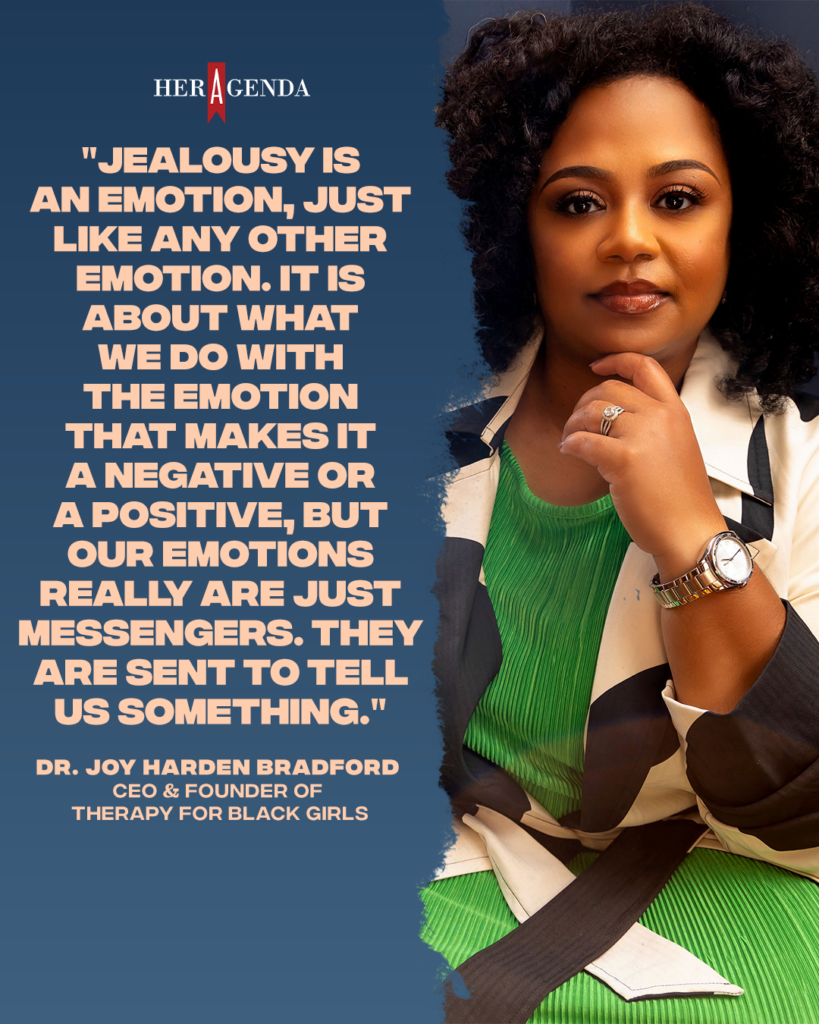
Her Agenda: Her Agenda focuses on millennial women, so many of our audience, and I’m sure women in all stages of life, are in transition right now. They’re moving out of state, starting new jobs, etc. For those people going through a major change, how do you recommend making new friends as an adult?
Dr. Joy Harden Bradford: This is such a hard question, but it’s such an important one, right? Because when we think about grade school, we were just friends with the person that sat next to us or the person who we played at recess with, right? And of course, as we get older, that is much more difficult ’cause we’re not necessarily in the same setting with people all the time. And so what I typically encourage people to do is to look around in your background to see if there’s somebody who might be able to move to the foreground. Is there somebody that you might ask, ‘Hey, do you wanna grab a smoothie after yoga class?’ Or when you’re dropping off your child at carpool, do you see a fellow mom who is in the line, and you can say like, ‘Hey, do you wanna grab breakfast after we drop the kids off?’ So looking around in our background to see if there’s somebody who we might be able to be a little bit more intentional with is a great thing. I think it’s important to let people know that you are open to new connections. People have different feelings about being set up on blind dates, but if you let people like coworkers and church members know, like, ‘Hey, I’m new to this city, I’m interested in meeting new people who have similar interests.’ You would be surprised by who you might be introduced to.
Her Agenda: What mistakes do you think people should avoid when trying to make new friends?
Dr. Joy Harden Bradford: Yeah, one common mistake is putting too much pressure on the situation. If you are new to town and you’re like, ‘Oh, I desperately want to find somebody who’s gonna be my bestie in town.’ I think you can put some unnecessary pressure on a situation. I think going into situations with the idea that this just may be another cool person to meet, not necessarily your new best friend forever, but can we go to a movie together? Keeping the stakes pretty low at first until you get to know them is [important]. Because you might actually like this person, but if you put too much pressure on the situation, then it may kind of fizzle out quicker than you want to. I think the main mistake is going into it with unrealistic expectations.
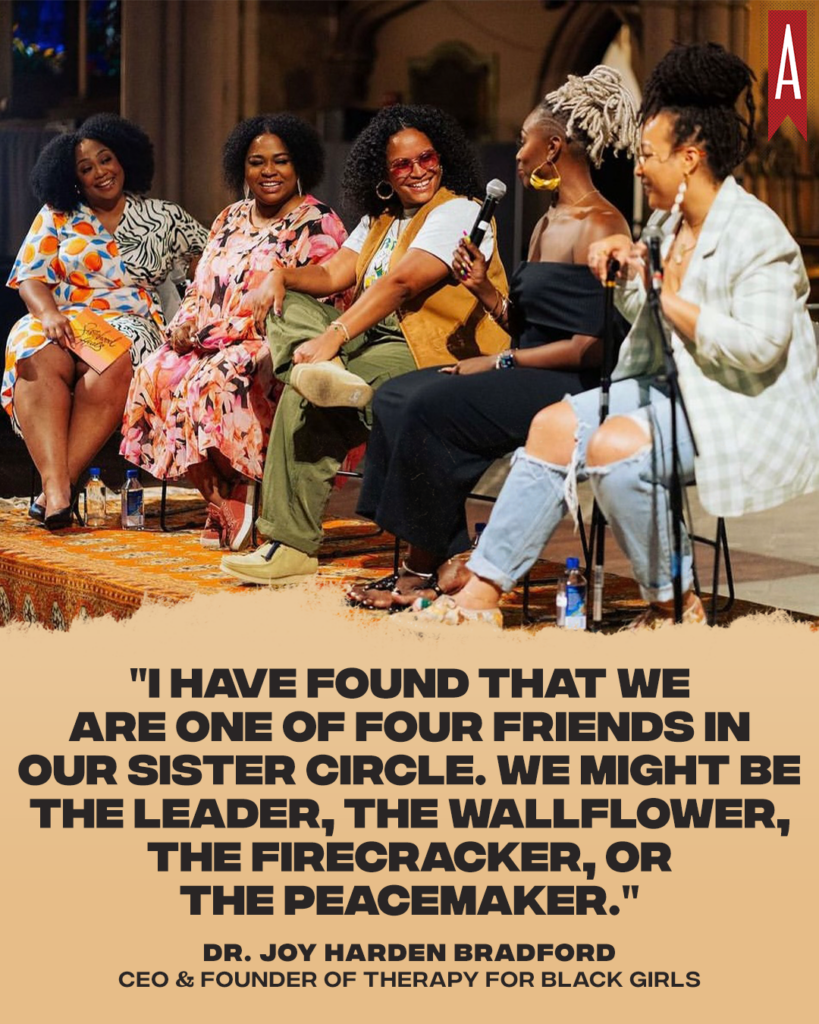
Her Agenda: How should we handle it if we’re ghosted by a new friend?
Dr. Joy Harden Bradford: Ooh, ooh, ghosting is so painful, y’all. So there is a whole section in the book about ghosting, but if you have not read it or hadn’t gotten to that part yet, it’s really painful, and people don’t like it when you ghost them. It’s a good skill for us to learn how to have difficult conversations. If you meet a new friend and things don’t work out, I think it’s okay to say to them like, ‘Hey, it’s been great to get to know you, but I’m not sure we have that much in common.’ Whatever your reason is for not wanting to continue, it’s okay to say that. We all have the experience of knowing when something is just not a good fit, or it’s not going to work out. And instead of leaving that person to come up with all these conclusions about why you’re no longer calling, it’s much, much better and healthier for everybody if you can actually say that to them.
Her Agenda: Yes. Use your words, everybody! I know you’re on this Summer of Sisterhood tour for your book. What has been a common theme that’s come up in some of the chats you’ve been having on the road?
Dr. Joy Harden Bradford: The one around making friends as an adult has come up a lot. But the other thing that has really come up is friendship breakups. So sadly, you know, sometimes friendships end, and it doesn’t have to be that anybody did anything wrong. Sometimes friendships just run their course. It’s important that, especially if somebody has been significant to you, you are able to say like, ‘Hey, I think our lives are moving on different paths,’ or, ‘You know, my life has gotten really busy, and I don’t feel like I can show up for you in the way that I want.’ Whatever it is, it is really important to be able to say that. The other thing that has come up is jealousy and kind of feeling like, ‘Oh if I’m jealous, does that mean that I’m a bad friend?’ What I have been telling people is that jealousy is an emotion, just like any other emotion. It is about what we do with the emotion that really makes it a negative or a positive, but our emotions are just messengers. They are sent to tell us something. And usually, jealousy is speaking to an unmet need somewhere. So are, you wanting a different kind of career? Do you want a different kind of relationship? What is it that you see in your friend’s life that is sparking that jealousy? And what kinds of things can you do in your own life to really take care of that need for yourself? So it doesn’t have to mean that you’re a bad friend or that you are wishing your friend ill. It typically is a message to you to turn inward to see what kind of unmet needs you have.
Her Agenda: On social media, you see a lot of people talking about spinning the block by going back to an ex after a romantic relationship has ended. What are your thoughts on spinning the block in a platonic sister-friend relationship? Like if it didn’t work out then, but you want to revisit and rekindle an old friendship.
Dr. Joy Harden Bradford: There are a couple of questions that you want to ask yourself before you spin the block, either with a friendship or a romantic relationship, honestly. One you want to really think about is what’s different now that wasn’t the case before. So what really has changed since you ended the friendship? So maybe you ended the friendship because it was distance, and now y’all are back in the same town, and it feels easy to pick up where it left off. But sometimes, things have actually happened. So maybe there was a betrayal, or they were dishonest. And so, if that was the case, is there any evidence that things are actually different now before you really want to restart the friendship? The other question you want to ask yourself is, are you interested in moving forward with this person, or are you just interested in any friendship? Because sometimes we get really stuck in the history and ‘Oh, they’ve been there for so many incredible moments and all of those things,’ but it might not actually be a healthy friendship. And so I think you do wanna think about, ‘Am I just lonely, or do I really want to do the work to rebuild this friendship with this person?’
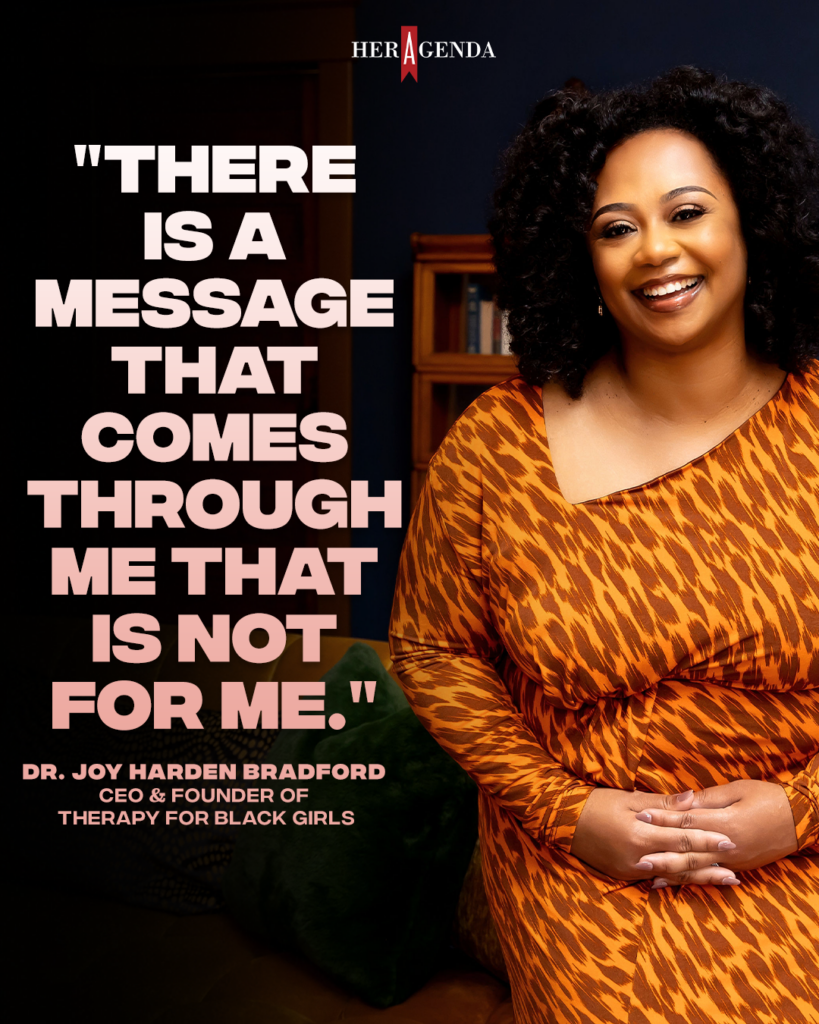
Her Agenda: Those are great questions to think about. I want to shift gears for a second. You are the host and founder of Therapy for Black Girls. So I would love for you to tell anyone listening who isn’t familiar, I don’t know if they’re under a rock, but if they’re not familiar, can you tell the audience about that?
Dr. Joy Harden Bradford: Yeah. Therapy for Black Girls is a platform designed to make mental health more relevant and accessible for Black women and girls, and we do that in a couple of different ways. We have a therapist directory that has therapists across the country and in Canada who love doing great clinical and working with Black women and girls. If you need some support or somebody in your circle might need some support, then that would be a great place to start your search. You can find that at therapyforblackgirls.com/directory. We also try to break down that stigma related to mental health on our weekly podcast. We have a podcast called Therapy for Black Girls – new episodes come out every Wednesday morning. And we have lots of just incredible conversations about all kinds of things, mental health related. We just released episode 315 of the podcast last week.
For the full video interview with Dr. Harden Bradford watch via the video player above or click here to watch the playback of our #HerAgendaLive here for our exclusive conversation with Dr. Harden Bradford.

